'It was a frightening time to be a woman in Cambridge'
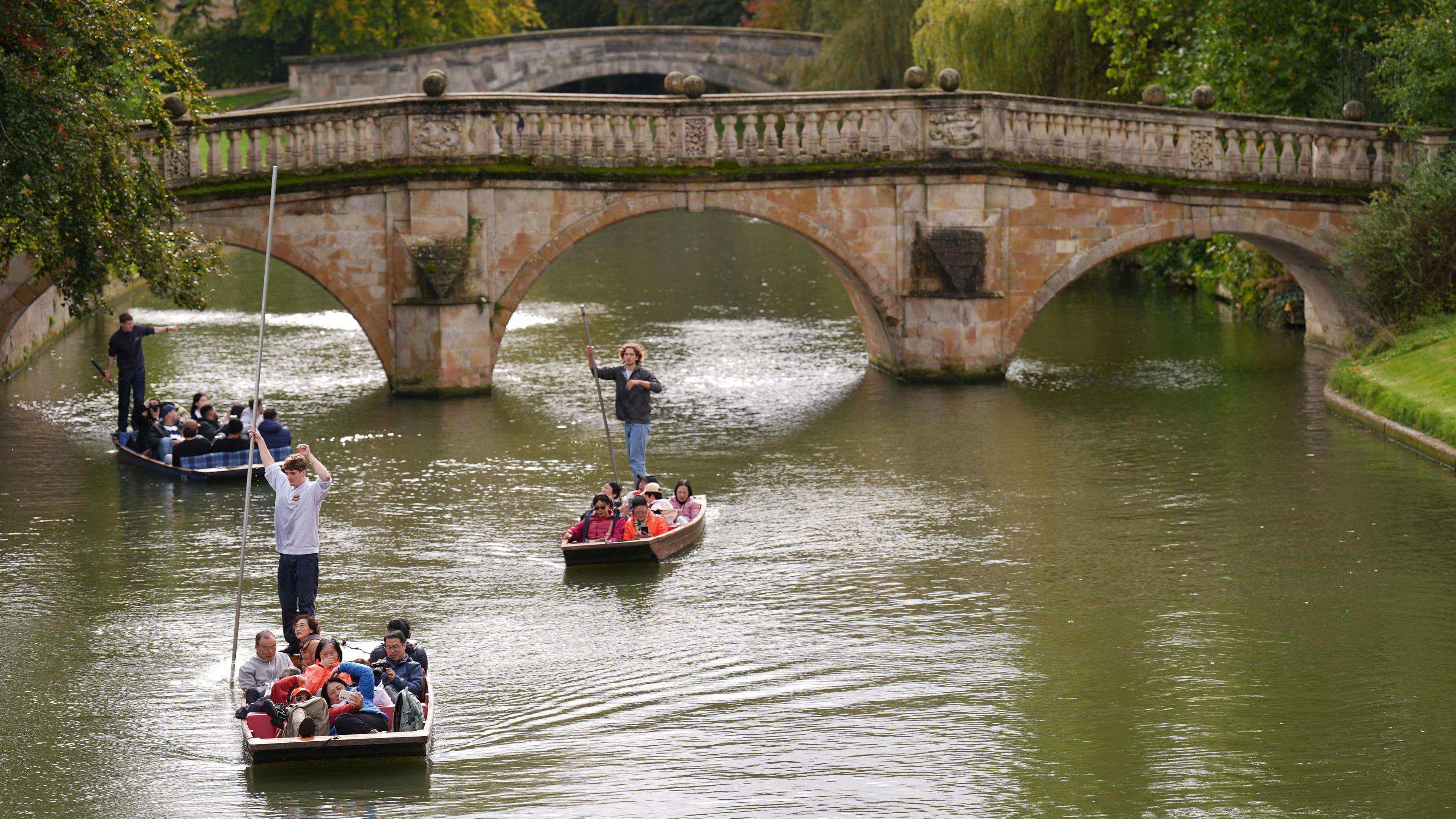
An attacker 50 years ago had left residents in the idyllic city of Cambridge scared
- Published
An air of menace spread over the university city of Cambridge as students were settling in for a new term 50 years ago. Young women were being attacked in bedsits, flats and hostels by a serial rapist who would evade capture for months - until a patrolling police officer had a chance encounter with a cyclist in a red coat.
Many decades have passed, but Anne Campbell still vividly remembers the mounting fears of women in Cambridge as it became clear in the autumn of 1974 that a serial rapist was at large.
Having studied maths at Newnham College in the early 1960s, she was by then a 34-year-old mother living with her husband and three children on Eltisley Avenue.
"We were living at the centre of where the rapist was active and were all terrified," she recalls.
"I well remember the terror he struck in the area - never knowing where he would strike next."
Mrs Campbell, who would go on to become the city's MP and help to ensure the man responsible was never released from prison, says memories from that time are "still so fresh".
The known attacks - 10 in all - were escalating and becoming more brutal, with some victims being cut or stabbed by the knife-wielding assailant.
Dubbed the Beast of Bedsit-Land by the Cambridge Evening News, the attacker sometimes took to horrifying his victims by wearing a black mask scrawled with the word "rapist".
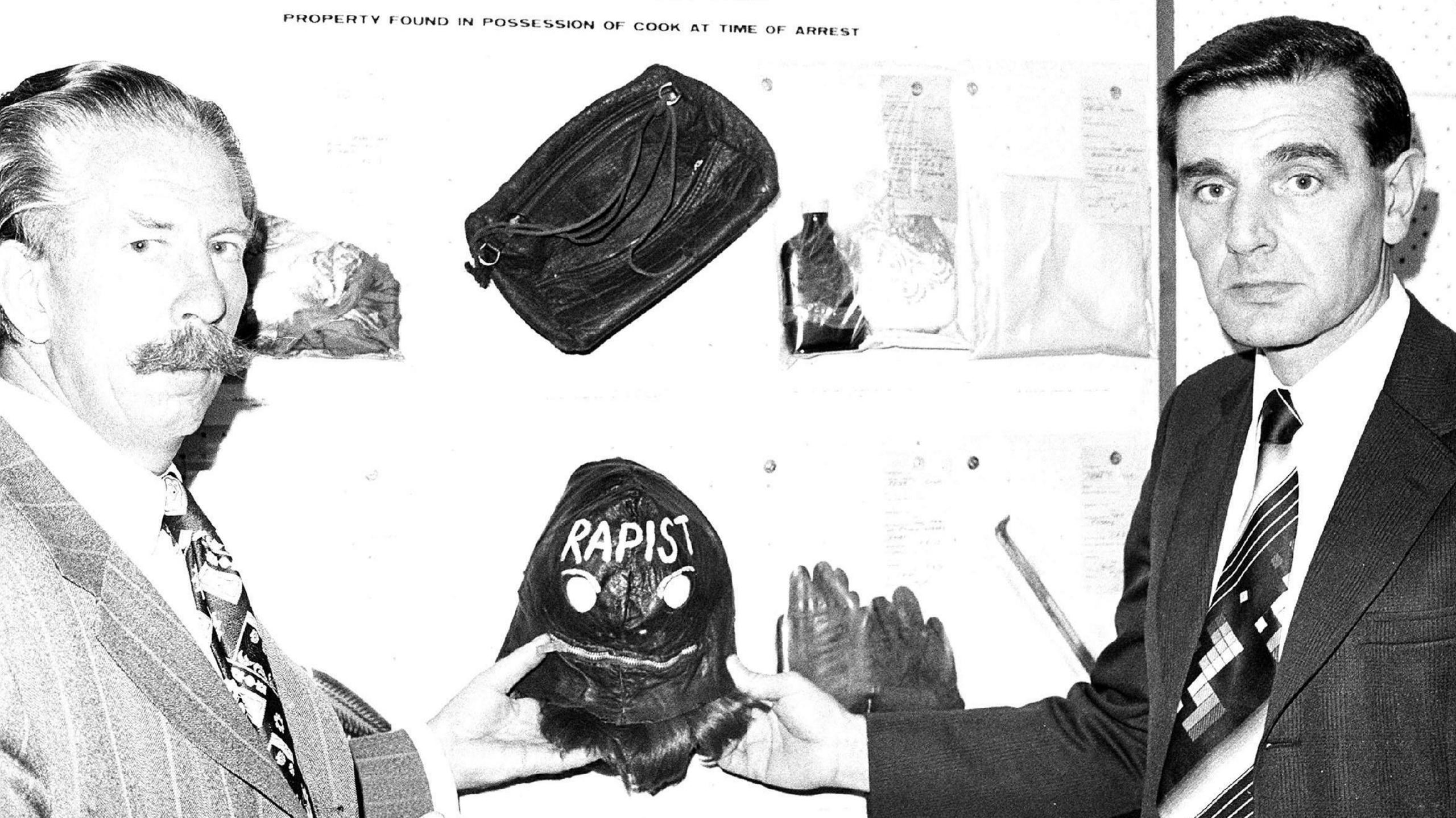
Det Supt Bernard Hotson (left) and Det Ch Supt Charles Naan showed some of the items found at the time of the man's arrest
Young women were living in numerous residences around Cambridge in the 1970s - as in any town or city - and the first reported attack did not grab the headlines.
A 20-year-old secretary was in a shared house on 18 October 1974. She was alone and had just taken a bath when the lights went out.
She was raped by an intruder - and this set a pattern that would soon lead police to believe a serial rapist was at large.
Student Paul Bahn began following the reports in the local paper and later went on to write a book about the events.
"It was a frightening time to be a woman in Cambridge - my girlfriend was terrified," says Dr Bahn, who was a 21-year-old PhD student in 1974.
"The second attack made some people sit up and take notice. By the third attack, it was clear there was a pattern."
Gradually, reports gave more details of the suspect.
He was said to be in his mid-20s and of short stature, according to his victims.
"Young women in Cambridge were the most worried - and then it was the shorter men," says Dr Bahn.
"Everyone was looking at them in the street, so it was also not a good time to be a short man.
"And in the city, sales of locks and alarms and pepper spray were sky-high."
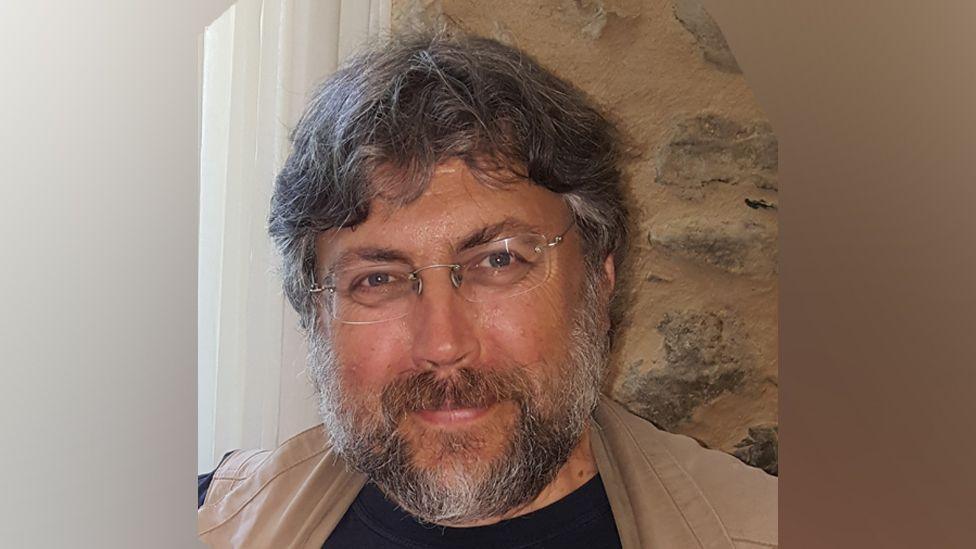
Dr Bahn had been a student at Cambridge University when the attacker was active in the 1970s
As the attacks continued, students at Dr Bahn's college - Gonville and Caius - set up a widely publicised "bodyguard service".
Pairs of male students offered to accompany women home or stay at their lodgings overnight in an attempt to make them feel safe and ward off a potential attacker.
"I was involved right at the start," says Dr Bahn, now aged 71.
"There was tremendous publicity but we got only three calls on the first night.
"Not a single student called, never. They didn't want to feel they needed to be protected by men, I think."
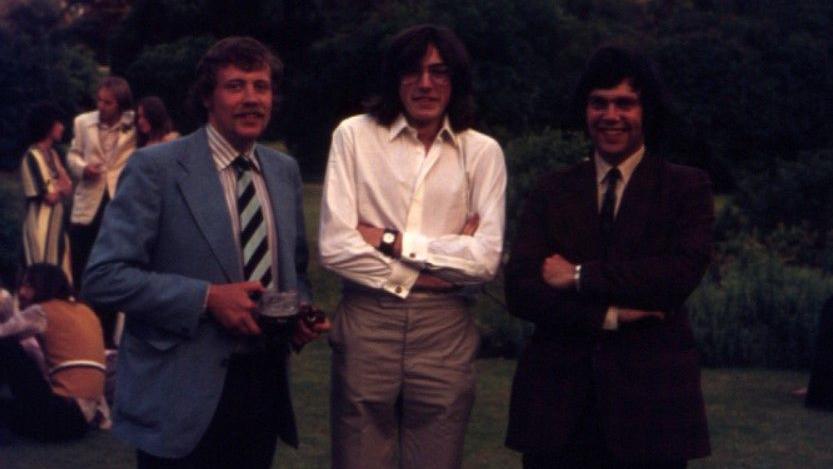
Paul Bahn (centre) with his fellow "student bodyguards" Richard Jopling (left) and Dave Carter
Peter Samuel Cook, 46, was eventually unmasked as the man whose terror had gripped Cambridge for eight months.
Det Con Terry Edwards was on Selwyn Road patrolling in the early hours of the morning on 8 June 1975.
He was about a mile from Owlstone Road, where a woman had been attacked with a knife.
He saw a woman in a red coat riding a bicycle, but as police had been told to stop everyone he ordered the rider to halt - and a tussle ensued.
A wig came off and the man tried to get away.
A nearby resident rushed out to help the officer and together they found a knife and stopped him.
When he was caught, Cook had a plethora of evidence that would incriminate him, including disguises, his mask and the chemical ether, to drug his victims.
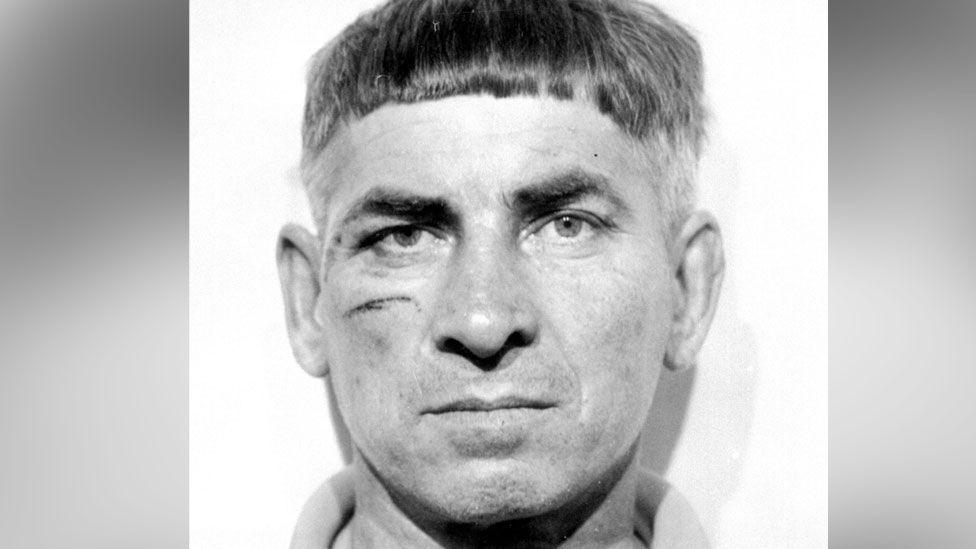
Peter Cook's custody photo showed an injury to his cheek, after the officer who captured him hit him with a heavy torch during a struggle
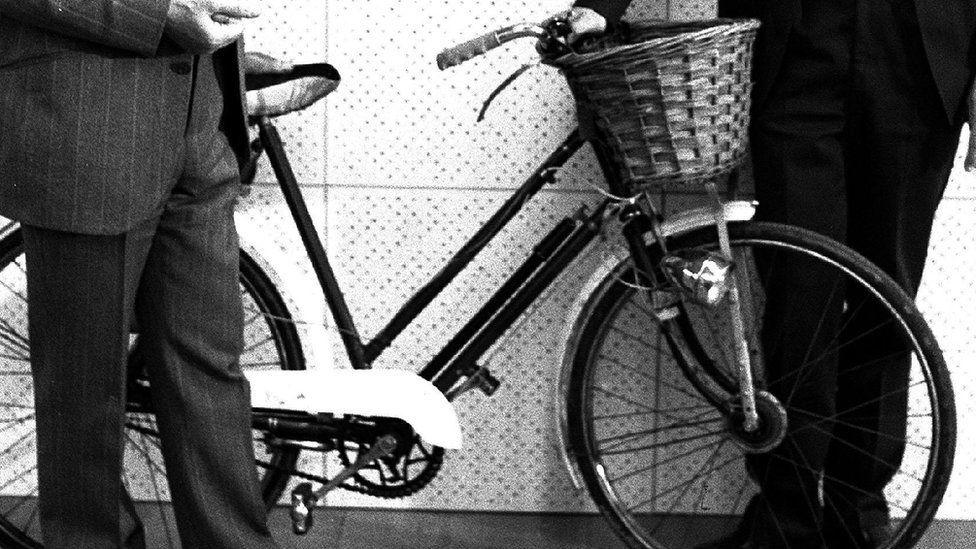
Cook used a bicycle to move around the city and was eventually caught while using it
Cook was convicted in 1975 of raping six women, wounding two more and committing an act of gross indecency on a ninth female victim.
At his trial, Mr Justice Melford Stevenson gave him two life sentences and recommended he should spend the rest of his life in jail.
How Cambridge rapist Peter Cook terrified residents in the 1970s
'Feeling of huge relief'
Despite the sentence, in 1995 there were moves to have Cook released on parole or moved to an open prison.
Mrs Campbell was the Labour MP for Cambridge from 1992 to 2005, and pressure from her helped ensure Cook remained behind bars.
The then Home Office minister Michael Forsyth pledged Cook would only be released if he was no longer considered a danger.
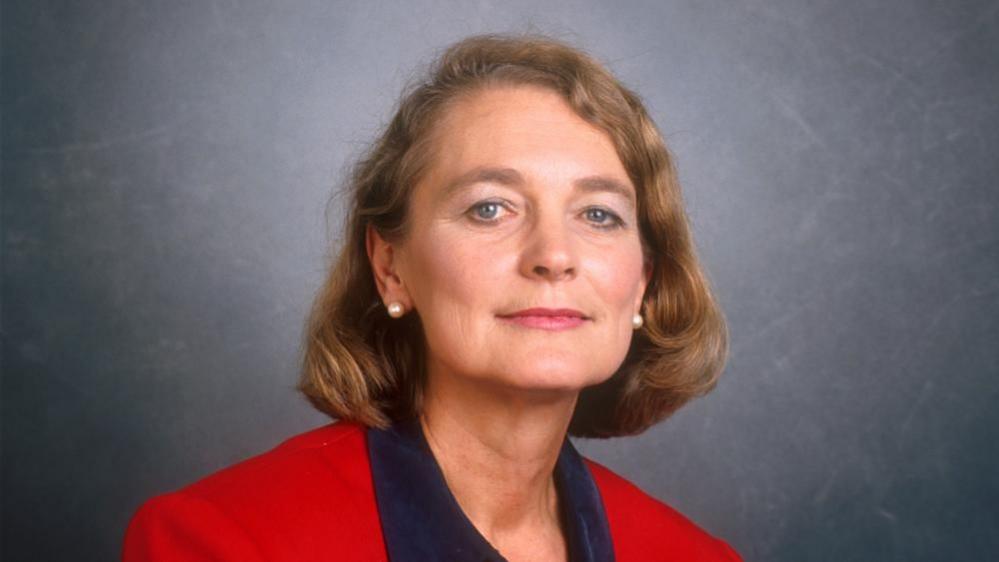
Anne Campbell, pictured in 1996, campaigned to keep Cook in jail
Speaking about what it was like in those few months in the 1970s, 84-year-old Mrs Campbell recalls that "everyone was on high alert and very anxious".
She says her husband would walk their babysitters home to their own houses, "just to make sure there was no Peter Cook hiding in their wardrobes".
When Cook was eventually captured, she says it took a while for the news to get through to everyone.
"Communications weren't so instant - there was no internet, no emails - I think I found out because someone told my husband while he was walking the dog," she says.
"But there was a feeling of huge relief throughout the city."
Mrs Campbell's campaign to prevent Cook's move to an open prison was prompted when women began coming to her as an MP and expressing their fears.
She says: "One woman said her best friend had been a victim - attacked and mutilated by Cook.
"They were all horrified he might get out, so I expressed those concerns to the minister. And these memories are still so fresh."
Cook died in Winchester Prison from natural causes in January 2004, at the age of 75.
Cook's known attacks
18 October 1974 - Cook raped a 20-year-old woman living in a shared house on Springfield Road after cutting the power
1 November 1974 - He raped a girl, 20, and attempted to strangle her in Abbey Road - again having cut the power
11 November 1974 - Cook turned up on the doorstep of an Australian woman, 29, at her flat on Huntingdon Road. He tried to strangle her but fled after she fought back
13 November 1974 - A student at Homerton College on Hills Road, 18, was dragged from a sound-proofed music room, beaten and raped in a remote shed
8 December 1974 - A 21‐year‐old student was asleep in a bed in a block of flats in Newnham when she was woken by Cook, who cut her nightdress off with a knife and raped her in the grounds
15 December 1974 - Cook returned to the same flats on Huntingdon Road, raping a woman, 20, cutting her face, arms and hands with a knife
13 April 1975 - Cook raped a 23-year-old woman at her home on Marshall Road. It was the first time a victim reported her attacker in a mask
4 May 1975 - At a New Hall College hostel off Madingley Road, Cook attempted to break into female students' rooms but was thwarted as locks had been installed on internal doors and one girl's boyfriend was there
6 May 1975 - On Pye Terrace, Cook carried out his first known daylight rape on a woman in her 20s
8 June 1975 - A Canadian woman, 27, was attacked at Owlstone Croft, a hostel used by Addenbrooke's Hospital staff and students. Her screams were heard and Cook fled the scene, but he was captured making his escape
Get in touch
Do you have a story suggestion for Cambridgeshire?
Follow Cambridgeshire news on BBC Sounds, Facebook, external, Instagram, external and X, external.